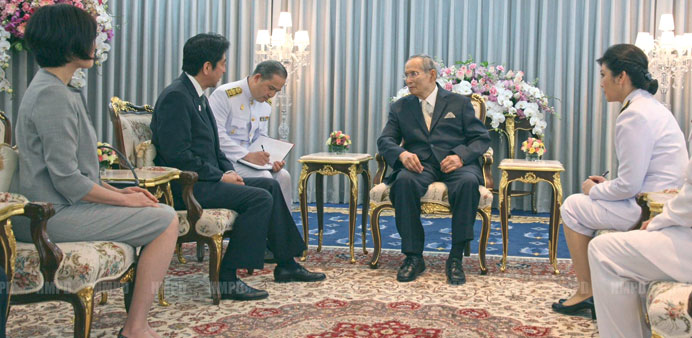Reuters/Bangkok
Japanese Prime Minister Shinzo Abe visited Thailand yesterday, part of a three-country Southeast Asian tour to consolidate business ties in one of the world’s fastest-growing regions and counter growing Chinese assertiveness.
Tension remains high over China’s claims on parts of the strategically vital and mineral-rich South China Sea that are also claimed by four Southeast Asian countries including Vietnam, which Abe visited on Wednesday.
Abe and his Thai counterpart Yingluck Shinawatra gave no indication at a news conference after talks whether any progress had been made on this issue, making only general comments about security that did not mention the South China Sea.
The Japanese premier leaves for Jakarta today, where he is expected to give a major policy speech.
Relations between Tokyo and Beijing have been frosty since a dispute over islands in the East China Sea, known as Senkaku in Japan and Diaoyu in China, flared up last year. Violent anti-Japanese protests have been staged in Chinese cities.
“China has successfully built up its own military power but for what? We celebrate China’s economic growth but it’s not a good idea to threaten others or urge others by coercion or intimidation,” Yutaka Yokoi, a Japanese foreign ministry official, said in Bangkok.
Having taken on the role of mediator in the multi-layered South China Sea disputes, Thailand has said it would listen to what Japan has to say but would also take into consideration the views of other countries involved.
Analysts have said Abe will have to tread carefully in Southeast Asia to avoid provoking China by appearing to be trying to “contain” it. Moreover, his hosts will be keen to avoid upsetting China, now their major economic partner.
In Hanoi on Wednesday, Abe, on his first foreign trip since sweeping to power last month, agreed with Vietnamese Prime Minister Nguyen Tan Dung that disputes in the region should be solved through peaceful talks and international law.
Already one of the biggest foreign investors in Southeast Asia and the largest in Thailand, with its firms pouring 312bn baht ($10.5bn) into the country in 2012, Japan is keen to step up its economic presence in the region.
Abe’s visit to Bangkok is the first by a Japanese prime minister in 11 years and comes as more Japanese firms look at setting up shop in the emerging economies of Southeast Asia because of the soured climate in China.
Thailand is not without problems: in addition to serious, disruptive bouts of political unrest in the past few years, it suffered its worst floods in half a century in 2011, with flood walls at seven huge industrial zones breached.
That disrupted the supply chains of big Japanese firms such as car maker Toyota Motor Corp
“This is our opportunity to reassure Japan that we are serious about flood prevention and to reiterate that the 350bn baht ($11.72bn) we pledged for flood management will continue to focus on early warning systems,” said Damrong Kraikuan, director-general of the Thai foreign ministry’s East Asia Affairs department.
Japan is showing huge interest in Myanmar, which borders Thailand and is opening up after decades of military rule.
Thai officials said Abe’s trip would be an opportunity to discuss Japanese involvement in the $50bn Dawei economic zone in southern Myanmar, which is being developed by Thailand’s Italian-Thai Development Pcl.
The project has struggled to secure the initial $8.5bn needed to finance infrastructure and utilities.
“Thailand has invited Japan to join and invest in the Dawei project in Myanmar and we hope Japan will join our two countries in this endeavour,” Yingluck told the news conference.
Abe described Thailand as “the gateway to Southeast Asia” but made no comment on Dawei. Neither he nor Yingluck took questions, simply reading prepared statements.
In September a source close to the Dawei project said a state-backed Japanese soft loan totalling $3.2bn was being secured to help kick-start construction on basic port and road infrastructure.
Ministers from Thailand and Myanmar met in November and said funding for the project’s first phase would be decided by February, with construction set to begin no later than April.
Yokoi from the Japanese foreign ministry suggested Tokyo was treading carefully on the project.
“We are willing to see the outcome from the talks between Thailand and Myanmar and would like to be kept informed but we still don’t know what the size of investment or opportunities will be,” he said.

Thailand’s King Bhumibol Adulyadej with Japan’s Prime Minister Shinzo Abe and his wife during a meeting at Siriraj Hospital in Bangkok yesterday.
